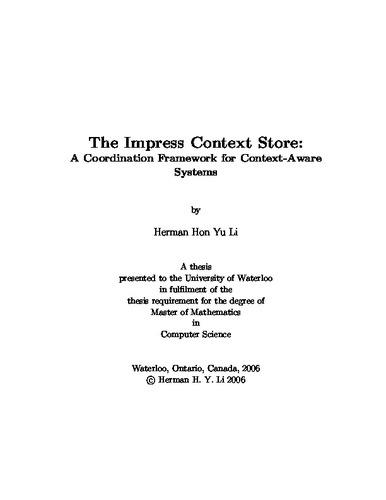| dc.contributor.author | Li, Herman Hon Yu | en |
| dc.date.accessioned | 2006-08-22 14:20:09 (GMT) | |
| dc.date.available | 2006-08-22 14:20:09 (GMT) | |
| dc.date.issued | 2006 | en |
| dc.date.submitted | 2006 | en |
| dc.identifier.uri | http://hdl.handle.net/10012/1091 | |
| dc.description.abstract | The dream of weaving technology into our everyday fabric of life is recently being made possible by advances in ubiquitous computing and sensor technologies. Countless sensors of various sizes have made their way into everyday commercial applications. Many projects aim to explore new ways to utilize these new technologies to aid and interact with the general population. Context-aware systems use available context information to assist users automatically, without explicit user input. By inferring user intent and configuring the system proactively for each user, context-aware systems are an integral part of achieving user-friendly ubiquitous computing environments. <br /><br /> A common issue with building a distributed context-aware system is the need to develop a supporting infrastructure providing features such as storage, distributed messaging, and security, before the real work on processing context information can be done. This thesis proposes a coordination framework that provides an effective common foundation for context-aware systems. The separation between the context-processing logic component and the underlying supporting foundation allows researchers to focus their energy at the context-processing part of the system, instead of spending their time re-inventing the supporting infrastructure. <br /><br /> As part of an ongoing project, Impress, the framework uses the open standard, Jabber, as its communication protocol. The Publish-Subscribe (pubsub) extension to Jabber provides interesting features that match those needed by a context-aware system. The main contribution of this thesis is the design and implementation of a coordination framework, called the Impress Context Store, that provides an effective common foundation for context-aware systems. The separation between the context-processing logic and the underlying supporting foundation allows researchers to focus their energy at the context-processing part of the system, instead of spending their time re-inventing the supporting infrastructure. | en |
| dc.format | application/pdf | en |
| dc.format.extent | 4718539 bytes | |
| dc.format.mimetype | application/pdf | |
| dc.language.iso | en | en |
| dc.publisher | University of Waterloo | en |
| dc.rights | Copyright: 2006,
Li, Herman Hon Yu. All rights reserved. | en |
| dc.subject | Computer Science | en |
| dc.subject | Ubiquitous computing | en |
| dc.subject | pervasive computing | en |
| dc.subject | context-aware systems | en |
| dc.subject | distributed systems | en |
| dc.subject | publish subscribe | en |
| dc.subject | instant messaging | en |
| dc.subject | Jabber | en |
| dc.subject | Impress | en |
| dc.subject | Impress Context Store | en |
| dc.title | The Impress Context Store: A Coordination Framework for Context-Aware Systems | en |
| dc.type | Master Thesis | en |
| dc.pending | false | en |
| uws-etd.degree.department | School of Computer Science | en |
| uws-etd.degree | Master of Mathematics | en |
| uws.typeOfResource | Text | en |
| uws.peerReviewStatus | Unreviewed | en |
| uws.scholarLevel | Graduate | en |

